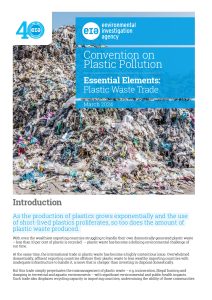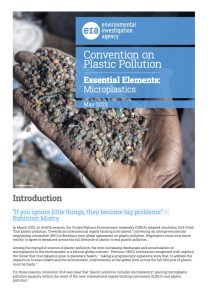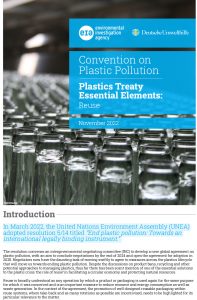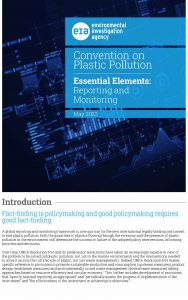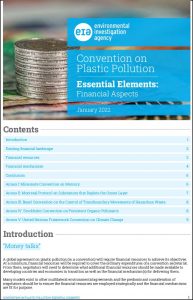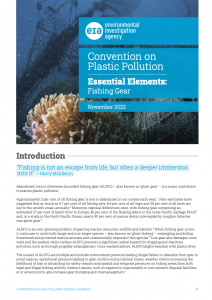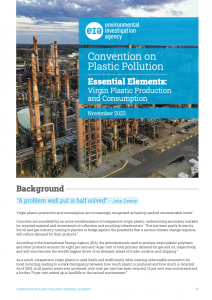Essential Elements
Welcome to the Environmental Investigation Agency’s ‘Convention on Plastic Pollution: Essential Elements’ series – a collection of thematic briefings that take an evidence-based approach to demystify complex issues related to the treaty.
The following briefings relate to specific issues which will come up during treaty negotiations and beyond. They speak to some of the ‘thornier’ topics that policymakers need to address, including the financing of a global treaty, plastic production and more. Ultimately the series intends to better equip policy- and decision-makers’ with the information needed to craft an ambitious and effective global treaty.
Plastic Waste Trade
With plastic production soaring and recycling rates abysmally low, plastic waste trade exacerbates the mismanagement of plastic waste, harming the environment and public health. The global treaty on plastic pollution is an opportunity to rectify the shortcomings of existing governance by proposing more stringent regulations on plastic waste trade, fostering a more sustainable global approach to plastic waste management.
Microplastics
Among the myriad of sources of plastic pollution, the ever-increasing discharges and accumulation of microplastics in the environment is a serious global concern. Previous UNEA resolutions recognised with urgency the threat that microplastics pose to planetary health, taking a progressively expansive view that, to address the impacts on human health and the environment, interventions at the global level across the full lifecycle of plastic must be made.
Reuse
The new legally binding instrument to end plastic pollution will need to consider measures across the full lifecycle of plastics. So called ‘midstream’ measures, for example on product design, will be essential to complement absolute reductions in plastic production. A fundamental challenge with a linear conception of plastic materials and products is not considering the environmental and societal benefits of both reduction and reuse, particularly when designing midstream policy measures. Thus, an essential element of the new global policy framework that needs specific consideration is the role of inclusive and accessible reuse systems in supporting the overarching policy ambitions of plastic pollution elimination.
It is time to move beyond simply banning products in isolation and use the opportunity of the treaty to envision, and create the framework for, a new and more sustainable model of consumption.
Reporting and Monitoring
A global reporting and monitoring framework is sine qua non for the incoming global plastics treaty. Ending plastic pollution will only be possible through mechanisms that can monitor progress towards sustainability. In order to achieve this, a combination of economic and environmental indicators, instituted through national reporting (bottom-up) and environmental monitoring (top-down), will be required.
Finance
A global treaty (i.e. convention) on plastics will require financial resources to achieve its objectives, and many models exist in other multilateral environmental agreements from which lessons can be taken. Significant resources are already being dedicated to marine and other plastic pollution – and will be for the foreseeable future – making the predominant issue how best to direct and deliver them in a coordinated, predictable and effective manner. The key consideration for negotiators should be to ensure the financial resources are employed strategically and the financial mechanisms fit for purpose.
Fishing Gear
Abandoned, lost or otherwise discarded fishing gear (ALDFG) – also known as ‘ghost gear’ – is a major contributor to marine plastic pollution and an ever-growing problem impacting marine resources, wildlife and habitats. However, the existing governance framework to address fishing gear requires significant improvement. A new global treaty targeting fishing gear would establish a single forum to oversee a comprehensive body of work to discuss and promote measures across the full lifecycle of fishing gear, ensuring coherent regional and national actions.
Production
Virgin plastic production and consumption have reached unsustainable levels. Overproduction has meant inexpensive virgin plastic is used freely and inefficiently, with unfavourable economics for most recycling, leading to a stark discrepancy between how much plastic is produced and how much is recycled. Sustainable production and consumption of virgin plastics will reduce biodiversity loss, help mitigate climate change, foster collaboration with virgin polymer producers, assist consumer goods companies and retailers and support municipalities and the waste industry.
